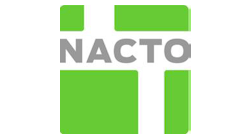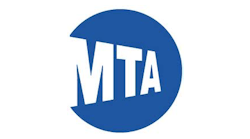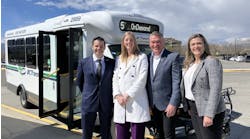National Association of City Transportation Officials (NACTO) President Seleta Reynolds, NACTO Chair Janette Sadik-Khan, and Thomas F. Prendergast, the Chairman and Chief Executive Officer of the New York Metropolitan Transportation Authority (MTA), North America’s largest transit agency, have announced that MTA has joined NACTO as its first transit agency member.
NACTO’s new transit agency membership category reflects the essential role of convenient, accessible public transit in creating sustainable 21st century cities. By joining NACTO, MTA demonstrates the role of street design in making urban transit more reliable and its vital importance for the next generation of transportation leaders.
In addition to its more than 6 million daily subway riders, the MTA moves 2.4 million bus passengers daily. To improve service, the MTA works closely with the NYC Department of Transportation (NYC DOT), the agency in charge of the vast majority of New York City’s streets, helping design and build dedicated transit lanes, integrated passenger boarding areas, and curbside service features that accelerate boarding and fare payment. MTA joins NACTO as American cities from Houston to Los Angeles to Seattle to Chicago are investing in innovative new bus networks, providing proven street design examples for a growing network of transit operators.
“Putting people and transit at the center of our cities’ streets makes city streets work better for everyone,” said Seleta Reynolds, general manager of the Los Angeles Department of Transportation and NACTO president. “Combining the strengths of transit agencies with street departments allows our cities to elevate transit with world-class street design.”
“A modern, transit-friendly street is more than just a bus lane or a sign at the curb,” said Janette Sadik-Khan, transportation principal at Bloomberg Associates and NACTO chair. “City streets are rails for our nation’s growing bus fleets, and transit must be designed into the street from the centerline to the sidewalk, not tacked on as an afterthought. MTA represents the needs of transit operators everywhere and will bring an essential voice to the street design process.”
“One of the MTA’s greatest challenges is to keep pace with the changing demands of the New York region’s public transit customers,” said MTA Chairman and CEO Thomas F. Prendergast. “A growing population, emerging employment centers, the rebirth of neighborhoods and creation of brand new ones all mean that systems—both street and subway—designed long ago have to evolve. MTA’s membership in NACTO will help us meet that challenge.”
“DOT has been working closely with our partners at the Metropolitan Transportation Authority, and so we know how innovative street design can dramatically enhance bus rapid transit,” said New York City Department of Transportation Commissioner Polly Trottenberg, whose agency has worked with the MTA to open 10 “Select Bus Service” routes since 2008. “Together, our two agencies have designed bus routes that are faster, safer and more reliable—and the increase in ridership along these routes is proof that innovative design can help expand access and opportunity for hundreds of thousands of New Yorkers every day.”
In the last eight years, MTA and NYC DOT have collaborated to establish the first 10 high-performance Select Bus Service routes on the city’s challenging streets, featuring fewer stops, off-board fare collection, and all-door boarding. In that time, NACTO has emerged as the leading national authority on city street design, publishing a series of new guides that have been rapidly adopted by cities and states, and that have been officially supported by the federal government. This spring, NACTO released the Transit Street Design Guide, produced with input from 45 cities, documenting new street treatments that have been tested, implemented, and refined in cities that are greatly expanding surface transit, including Austin, Denver, Minneapolis, Philadelphia, and Salt Lake City. The transit guide highlights strategies such as shared transit streets, transit boulevards, and service enhancements like transit-friendly signals and sidewalk passenger boarding queues that can speed travel times, as well as make streets more inviting to pedestrians and bicyclists. MTA and NYC DOT were major contributors to the guide, lending their transit expertise to the national body of best practices.




